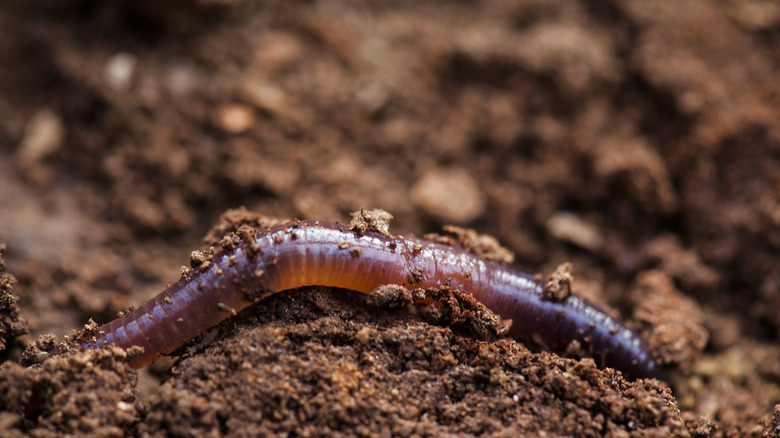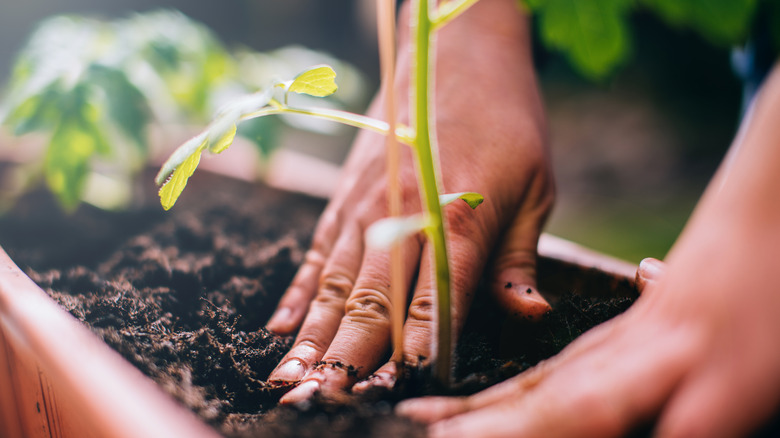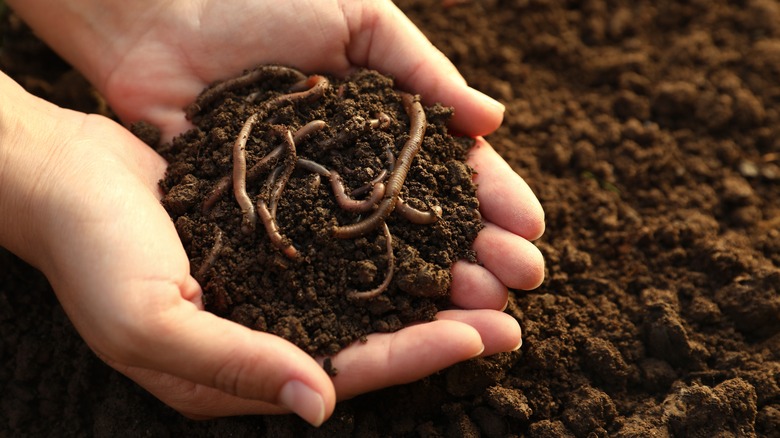The Unexpected Problems Earthworms Can Create In Your Garden
There are some types of worms you definitely don't want to see in your garden. Earthworms, however, are often heralded as the unsung heroes of your green space, playing a crucial role in soil health and fertility. These segmented invertebrates live in the soil and are known for their ability to decompose organic matter, such as dead leaves and plant material. By consuming this organic matter, earthworms break it down into smaller particles and mix it with the soil, enhancing its structure and promoting better aeration. This natural process not only improves soil drainage but also increases its nutrient content, making it more conducive to plant growth.
There are several species of earthworms, each contributing differently to soil health. For example, the common earthworm (Lumbricus terrestris), is known for its deep burrowing habits, which help in aerating the soil and improving its overall texture. On the other hand, species like the red wiggler (Eisenia fetida), are more surface-dwelling and are particularly effective in composting. Using eggshells in your composting can attract worms to your garden. But despite these benefits, the prolific activities of earthworms can sometimes lead to unforeseen problems. While they generally enhance soil quality, excessive tunneling and nutrient dynamics can occasionally result in soil instability and other issues.
Impact on soil and plant health
Earthworms are often hailed as nature's little gardeners, aerating soil and boosting fertility. But even these beneficial creatures can have a surprising downside. Their burrowing activities can disrupt delicate root systems, especially for young seedlings. Imagine a tiny plant struggling to establish itself, only to have its lifeline nibbled by a hungry worm. Furthermore, earthworms have a hearty appetite for organic matter, the very food source your plants rely on. If their population explodes, they could deplete the soil, leaving your precious blooms famished. Think of them as overzealous composters, taking things a bit too far.
Another potential concern is the party these wigglers throw for unwelcome guests. The scent of earthworms can attract moles and voles, notorious for their tunneling antics. Before you know it, your garden may resemble a miniature battlefield of raised earth and displaced plants. However, in a healthy, balanced garden, earthworms are generally more helpful than harmful. They contribute to a thriving ecosystem. But if you're facing pest issues or nurturing fragile seedlings, it's wise to consult a gardening expert. They can help you determine if earthworms are a friend or foe in your specific situation.
Earthworms and nutrient imbalance
Earthworms can also contribute to nutrient imbalances in your garden, a problem often overlooked by gardeners. Although earthworms are beneficial for breaking down organic matter and enriching the soil with nutrients, their activity can sometimes lead to excessive nutrient release. As earthworms consume organic material, they produce castings that are rich in nutrients like nitrogen, phosphorus, and potassium. While these nutrients are beneficial in moderation, an overabundance can lead to nutrient imbalances that affect plant health. For instance, too much nitrogen can result in excessive foliage growth at the expense of root development, while an excess of phosphorus can inhibit the uptake of other essential nutrients.
Moreover, the rapid decomposition of organic matter by earthworms can sometimes lead to nutrient leaching, where valuable nutrients are washed away by rainfall before plants can absorb them. This can result in nutrient deficiencies and poor plant growth. To counteract these issues, gardeners can implement strategies such as monitoring soil nutrient levels regularly and adjusting fertilization practices accordingly. This helps ensure that earthworm activity remains beneficial and contributes to a balanced, healthy garden ecosystem.


